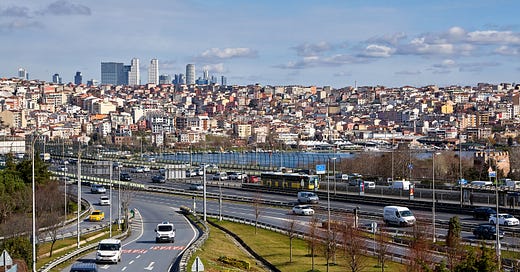Emerging Markets Daily - April 7
Global Economy to Grow 6%, IMF Says, Singapore's Grab To List in NY Via SPAC, Millions Fall from Global Middle Class, New E. Caribbean Digital Currency, UAE Nuke Energy Plant Goes Live
The Top 5 Emerging Markets Stories from Global Media - April 7
IMF Sees a Faster Economic Recovery as Vaccines are Deployed
The New York Times
“The global economy is expected to expand by 6 percent this year, up from a previous projection of 5.5 percent, after a contraction of 3.3 percent in 2020.”
“The global economy is recovering from the coronavirus pandemic faster than previously expected, largely thanks to the strength of the United States, but the International Monetary Fund warned on Tuesday that major challenges remained as the uneven rollout of vaccines threatens to leave developing countries behind.”
“The I.M.F. said it was upgrading its global growth forecast for the year thanks to vaccinations of hundreds of millions of people, efforts that are expected to help fuel a sharp rebound in economic activity. The international body now expects the global economy to expand by 6 percent this year, up from its previous projection of 5.5 percent, after a contraction of 3.3 percent in 2020.” Alan Rappeport reports
Singapore’s Grab Set to List in New York in Biggest SPAC Merger
The Financial Times
“Grab, south-east Asia’s most valuable start-up, is set for the largest merger between a private business and a blank cheque company in a deal that will value the SoftBank-backed technology group at about $35bn.”
“Singapore-based Grab, whose offerings include ride-hailing and financial services, could finalise an agreement to list in New York via one of Altimeter Capital’s special purpose acquisition vehicles as soon as this week, according to three people with direct knowledge of the situation.”
“The deal is being held up as a crucial first test for unicorns in south-east Asia that are preparing to go public this year. Founded in 2012, Grab offers access to a regional consumer market of more than 655m people across countries including Indonesia, Thailand and Vietnam.” Mercedes Ruehl, James Fontanella-Khan, Arash Massoudi, and Miles Kruppa report
Millions Falling From Global Middle Class in an Historic Setback
Bloomberg
“One of the most economically significant trends of the past few decades has been the emergence of a global middle class. The expectation that this cohort of consumers would continue to grow relentlessly, as rising incomes in developing countries lifted millions out of poverty each year, has been a central assumption in multinationals’ business plans and the portfolio strategies of professional investors.”
“You can now add that to the list of economic truths that have been upended by this pandemic. For the first time since the 1990s, the global middle class shrank last year, according to a recent Pew Research Center estimate. About 150 million people—a number equal to the populations of the U.K. and Germany combined—tumbled down the socioeconomic ladder in 2020, with South Asia and sub-Saharan Africa seeing the biggest declines.”
Shawn Donnan, Vrishti Beniwal, Marisa Wanzeller, Shannon Sims, Prinesha Naidoo, Randy Thanthong-Knight, Suttinee Yuvejwattana, Phil Kuntz and Michelle Jamrisko report
Eastern Caribbean To Issue Blockchain-based Digital Currency
AP
“The Eastern Caribbean has created its own form of digital currency meant to help speed transactions and serve people without bank accounts.”
“The Eastern Caribbean Central Bank said its ‘DCash’ is the first such blockchain-based currency introduced by any of the world’s currency unions, though some individual nations have similar existing systems.”
“It became available Wednesday, March 31, in a year-long pilot programme in four island nations: St. Lucia, Grenada, Antigua and Barbuda, and St. Kitts and Nevis.”
“While many in the Eastern Caribbean cheered the historic move, some experts worry that digital currency issued by smaller countries could end up being used as a conduit for illicit activities, including terrorism financing and money laundering, said Eswar Prasad, a trade policy professor at Cornell University.”
“‘That skepticism is waning as more central banks get into the act, and as central banks around the world face the inevitability of the declining use of physical cash,’ Prasad said.”
“He noted that the Bahamas last year became the first country to roll out its digital currency nationwide, and that the Marshall Islands is considering its own cryptocurrency. For smaller countries, ‘there is more at stake’ in part because many people remain unbanked, he said.” AP reports
Commercial Operations Begin at UAE's Barakah Nuclear Power Plant
The National
“It is a milestone moment for the Emirates as it becomes the first Arab country to operate a nuclear energy plant. The plant will provide about a quarter of the country’s electricity and eliminate up to 21 million tonnes of carbon emissions annually.”
“That is comparable to taking 3.2 million cars off the roads each year. Construction of the $25 billion nuclear plant began in 2011 with South Korean expertise. The Asian country's APR-1400 nuclear reactor is one of the most advanced in the world, with a lifespan of at least 60 years.” The National reports




